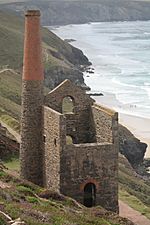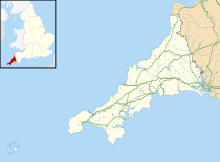Wheal Coates facts for kids

Towanroath Shaft
Pumping Engine House |
|
| Location | |
|---|---|
| Location | St Agnes |
| County | Cornwall |
| Country | England |
| Coordinates | 50°18′14″N 5°13′55″W / 50.304°N 5.232°W |
| Production | |
| Products | Tin |
| History | |
| Opened | 1802 |
| Closed | 1889 (reworked 1911-1913) |
Wheal Coates is an old tin mine located on the northern coast of Cornwall, UK. You can find it on the cliffs between Porthtowan and St Agnes. Today, the mine is looked after by the National Trust, a charity that protects important places.
A Look Back: The Mine's History
People have been mining at Wheal Coates for a very long time. The first records of a mine here go all the way back to 1692! The mine we see today officially opened in 1802. It became very busy by 1815, producing lots of tin.
Mining was hard work, especially at Wheal Coates. The mine tunnels went deep underground and even stretched out under the sea! This caused two big problems:
- Flooding: Water would constantly fill the tunnels.
- Bringing up ore: It was tough to lift the heavy tin ore from so deep.
These problems made mining difficult until new steam-powered machines arrived. These machines helped pump out water and lift the ore.
The mine was sold in 1844 and then closed for a while as it filled with water. A new owner tried to reopen it in 1872, but work was not steady. The mine finally closed in 1889 because the price of tin dropped too low.
At its busiest, about 140 people worked at Wheal Coates. They mined a layer of tin found just below sea level. There was another attempt to mine tin between 1911 and 1913, but it wasn't very successful. The mine closed for good in 1914.
Wheal Coates Today: What You Can See
The buildings you see at Wheal Coates today were built in the 1870s. This was when miners started digging much deeper underground. These old buildings were repaired and made safe in 1986.
There are three special engine houses that once held huge steam engines:
- Towanroath Pumping Engine House: Built in 1872, this engine house had a powerful machine. Its job was to pump water out of the 600-foot-deep Towanroath shaft.
- Whim Engine Houses: There are two of these, called "Old Whim" and "New Whim." These engines were used to crush the tin ore into smaller pieces. "Old Whim" was built in the mid-1800s, and "New Whim" was built later in the 1800s.
- Calciner: This building dates from 1910 to 1913. A calciner was used to heat the tin ore. This process, called calcination, helped remove unwanted stuff like arsenic from the tin.
All these surviving buildings are very important. They were officially listed as Grade II historic buildings in 1988. Wheal Coates is also part of the Cornwall and West Devon Mining Landscape, which is a special World Heritage Site. This means it's recognized as important to the whole world!
 | William M. Jackson |
 | Juan E. Gilbert |
 | Neil deGrasse Tyson |


